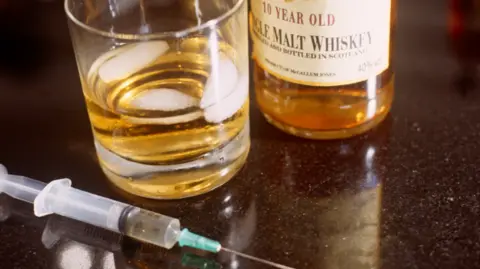Cross-border addiction services awarded £12.4m peace funding
 BBC
BBCTwo projects delivering addiction services in Northern Ireland and the border counties are to receive more than £12m in funding.
The money, allocated through the cross-border Peaceplus programme, is distributed between a project helping people with alcohol dependence and another piloting digital devices aimed at helping people who struggle with substance abuse.
Health Minister Mike Nesbitt said he looked forward to seeing each project "improve the lives of some of the most vulnerable people across our society".
"Substance use impacts the lives of too many individuals, families and communities across Northern Ireland, and indeed on both sides of the border," he said in a statement.
What is Peaceplus?
Peaceplus is a programme managed by the Special EU Programmes Body (SEUPB) and draws funding from the EU, and the UK and Irish governments, and the Northern Ireland Executive.
The programme has been designed "to promote peace and prosperity across Northern Ireland and the border counties of Ireland", and has a total value of €1.14bn (£950m) , to be delivered over the next five years.
It aims to provide funding to programmes helping people on both sides of the border, and has contributed to a number of projects including hourly rail services between Belfast and Dublin, and an indoor sports arena in Londonderry.
It was also responsible for a £300m post-Brexit investment in 2020.
 PA Media
PA MediaOne of the projects to benefit from the latest funding round is the Community Alcohol Detox+ Project, which said it exists to "support individuals in safely detoxing at home or a community space".
Detox+ said it aims to deliver "personalised care" to mitigate the effects of alcohol on individuals, families and communities.
BBC News NI has previously reported on record numbers of alcohol related deaths in Northern Ireland, and a coroner said that alcohol misuse as the "greatest healthcare problem" the country faces.
In 2022, Northern Ireland had the joint highest rate in the UK of deaths from diseases caused by alcohol
The second beneficiary of the latest round of Peace Plus funding is a project known as Substance Use and Mental Health Interventions using Digital Technology (SUMIT).
It's a pilot scheme aimed at giving people access to digital technologies and human support which will allow them to access the right support services while also teaching self-management.
Up to 1,500 beneficiaries will be targeted through four sites which will cover Letterkenny and Londonderry, prison services in Belfast, and sites in County Louth and Fife in Scotland.
'Joined-up approach'
Drug and alcohol addiction services in Northern Ireland have been put under "immense pressure" according to a 2022 report by the Northern Ireland Assembly.
It said that increased demand was to blame.
The Chief Executive of SEUPB, Gina McIntyre said: "With demands on health and social care services so high, cross-border co-operation can alleviate those pressures by delivering economies of scale.
"A joined-up approach can deliver more efficient and effective resources, maximising the potential of technology to transform how healthcare is accessed and delivered."
The Republic of Ireland's health minister, Steven Donnelly, added: "Research findings demonstrate a clear correlation between addiction and the legacy of conflict, so I am very pleased that addiction services have been identified as a specific intervention for support".
Substance abuse in NI - latest statistics
- In 2022, the latest year for which statistics are available, Northern Ireland had the joint highest rate in the UK of deaths from diseases caused by alcohol
- Between 2018 and 2022 the death rate was over three times higher in NI's most deprived areas than in the wealthiest areas
- Deaths due to drug-related causes have increased by 98% since 2012
- Between 2018 and 2022 44.4% of drug misuse deaths occurred in NI's most deprived areas
Sources: Office for National Statistics, Northern Ireland Statistics and Research Agency (NISRA) - Drug-related deaths and NISRA- Alcohol-specific deaths.
